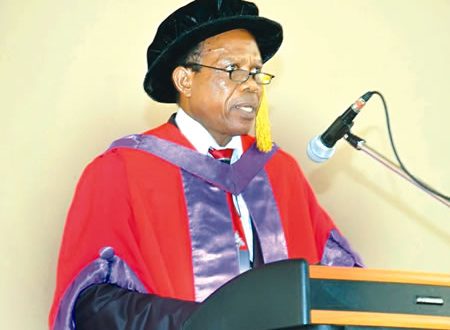The knowledge of soil dynamics in tillage and traction is important in developing agricultural and mechanised equipment for crop production. This will enhance soil productivity for maximum yield and guarantee food security in sub-Saharan Africa and Nigeria in particular.
This was the submission of Professor Seth Manuwa while delivering the 93rd inaugural lecture of the Federal University of Technology, Akure.
Speaking on the topic, ‘Agricultural Engineering: Curability and Potency for Sustainable Food Security and National Development’, Professor Manuwa said it was important to study the nature of the soil and its properties in order to cultivate soil sustainability.
Manuwa disclosed that the Department of Agriculture and Environmental Engineering of FUTA under his supervision had developed a device for this area of study.
He urged the government to encourage and support activities that will promote indigenous design and development of agricultural machines to suit different agro-climatic conditions and farmers in the country, and establish village workshops for blacksmiths, tinsmiths and carpenters to produce or modify existing small agricultural equipment that will enhance farming operations.
The lecturer said manufacturing industries are necessary in order to mass-produce at lower costs products from such design and development efforts, and that government should encourage them to survive by providing enabling an environment for their sustainability.
The professor of engineering stressed the importance of agricultural mechanization, said that it plays an increasingly important role in optimising agricultural production.
According to him, it reduces drudgery, increases the safety and comfort of the working environment, and enhances productivity, cropping intensity and sustainable agriculture.
Making a case for agricultural engineering, the lecturer said that it has the solution to the myriads of problems facing agricultural productivity in the world and Nigeria in particular, for it is a recognized focus of engineering skills and innovation that takes a multidisciplinary approach to agricultural problems for labour saving, increased productivity and value addition, rural development and improved quality of life.
He, however, warned that engineers must also take into account safety, efficiency, economy, reliability and constructability or ease of fabrication as well as the environment, ethical and legal considerations such as patent infringement or liability in case of failure of the solution.
In his remarks at the chairman of the occasion and vice-chancellor, Professor Joseph Fuwape, represented by the deputy vice-chancellor, (academics), Professor Tunde Arayela, commended the lecturer on the cerebral delivery of the lecture.
He described the lecturer as an erudite professor who had contributed immensely to research and academic development in his field of specialization and had been a consistently productive scholar in addition to providing leadership both for his students and younger academics since he took up appointment in the university.
 National Telescope national telescope newspaper
National Telescope national telescope newspaper



